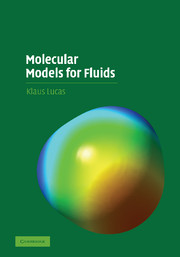Book contents
- Frontmatter
- Contents
- Nomenclature
- Preface
- 1 Introduction
- 2 Foundations
- 3 The Ideal Gas
- 4 Excess Function Models
- 5 Equation of State Models
- Appendix 1 Fundamental Constants and Atomic Units
- Appendix 2 Stirling's Formula
- Appendix 3 Relative Probability of a Microstate
- Appendix 4 Spherical Harmonics, Rotation Matrices, and Clebsch–Gordan Coefficients
- Appendix 5 Higher-Order Perturbation Terms for the Intermolecular Potential Energy of Simple Molecules
- Appendix 6 Rules for Integration
- Appendix 7 Internal Rotation Contributions
- Appendix 8 Quasichemical Approximation for the Degeneracy in a Lattice
- Appendix 9 Off-Lattice Formulation of the Quasichemical Approximation
- Appendix 10 Combinatorial Contribution to the Excess Entropy in a Lattice
- Appendix 11 Integration Variables for Three-Body Interactions
- Appendix 12 Multipole Perturbation Terms for the High-Temperature Expansion
- Index
1 - Introduction
Published online by Cambridge University Press: 11 March 2010
- Frontmatter
- Contents
- Nomenclature
- Preface
- 1 Introduction
- 2 Foundations
- 3 The Ideal Gas
- 4 Excess Function Models
- 5 Equation of State Models
- Appendix 1 Fundamental Constants and Atomic Units
- Appendix 2 Stirling's Formula
- Appendix 3 Relative Probability of a Microstate
- Appendix 4 Spherical Harmonics, Rotation Matrices, and Clebsch–Gordan Coefficients
- Appendix 5 Higher-Order Perturbation Terms for the Intermolecular Potential Energy of Simple Molecules
- Appendix 6 Rules for Integration
- Appendix 7 Internal Rotation Contributions
- Appendix 8 Quasichemical Approximation for the Degeneracy in a Lattice
- Appendix 9 Off-Lattice Formulation of the Quasichemical Approximation
- Appendix 10 Combinatorial Contribution to the Excess Entropy in a Lattice
- Appendix 11 Integration Variables for Three-Body Interactions
- Appendix 12 Multipole Perturbation Terms for the High-Temperature Expansion
- Index
Summary
Our society relies on the use of energy and matter in a plenitude of different forms. They are produced from natural resources by technical processes of energy and matter conversion that have to be designed in an economically and ecologically optimum way. In these processes it is the fluid state of matter that dominates the relevant phenomena. In particular, the properties of fluid systems in equilibrium enter into the fundamental process equations and control the feasibility of the various process steps. Models for fluids in equilibrium are thus a prerequisite for any scientific process analysis. Although fluid models can be constructed entirely within the framework of a macroscopic theory on the basis of experimental data, it is clear that this approach is limited to those few systems for which enough data can be obtained. Typical examples are the working fluids of the standard power generation and refrigeration processes. The vast majority of technically relevant processes are, however, concerned with complex fluid systems that cannot be analyzed experimentally in sufficient detail with a reasonable effort. In such cases one must turn to the microscopic basis of matter and design a theory based on the molecular properties of a fluid that requires only few data or is even fully predictive. In this introductory chapter we present an overview of the challenges of this approach by presenting a review of macroscopic fluid phase behavior in equilibrium, along with the problems associated with obtaining the necessary information from data. We also give a first introduction to the primary concepts of the microscopic world, including a brief glance at the properties of real molecules and the philosophy behind formulating molecular models.
- Type
- Chapter
- Information
- Molecular Models for Fluids , pp. 1 - 19Publisher: Cambridge University PressPrint publication year: 2007
- 1
- Cited by



